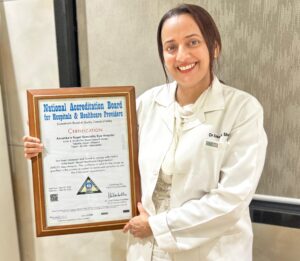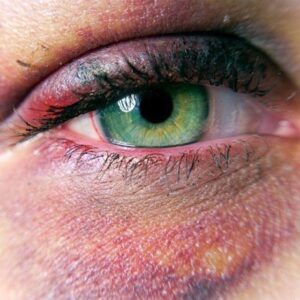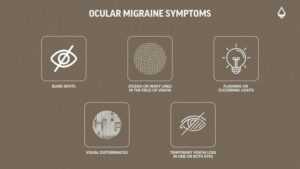
Anushka Super Speciality Eye Hospital
Call: 90044 44422 / 99213 44422 | Timings : 8.30 a.m to 5.30 p.m (Mon-Sat) | Add: Shri Swami Samarth Soc, Kaneri Dhamankar Naka, Bhiwandi




Accredited for Quality Care
Adverse Drug Effects in Eyes: The Hidden Dangers of Wrong Eye Drop Use
anushka
24 October 2025
In today’s world, where medicines are easily available at every corner pharmacy, many people buy and use eye drops without a doctor’s prescription. Redness, itching, irritation, or mild blurring often push people to ask the chemist, “Which drop should I use?”
While this might seem harmless, self-medicating with eye drops can sometimes do more harm than good. Wrong or prolonged use of over-the-counter (OTC) medicines can cause severe damage to the eyes, including vision loss in serious cases.
This article will help you understand:
- The dangers of wrong or unsupervised eye medicine use
- Common drugs that cause eye damage
- What “steroid responders” and “antibiotic resistance” mean
- Why it’s important to consult an eye specialist
- Answers to common FAQs like: “Which drop should I use for redness?”
1. The Reality of Over-the-Counter (OTC) Eye Medicines
Easy Availability, Hard Consequences
Many eye drops that contain steroids, antibiotics, or decongestants are easily available without prescription in India. Unfortunately, these medicines are powerful drugs meant for specific eye conditions — and when used blindly, they can cause serious side effects.
For example:
- Steroid drops (like prednisolone, dexamethasone, or loteprednol) are life-saving for inflammation but dangerous if used wrongly.
- Antibiotic drops are crucial for bacterial infections but ineffective for viral or allergic conditions.
- Decongestant or redness drops provide instant relief but can cause “rebound redness” and dependency if overused.
2. Steroid Eye Drops and the “Steroid Responder” Problem
What Are Steroid Eye Drops?
Steroid eye drops are prescribed to control inflammation after surgery, injury, or diseases like uveitis. They reduce swelling and pain — but they’re not meant for casual redness or irritation.
Who Is a Steroid Responder?
A “steroid responder” is a person whose eye pressure rises after using steroid drops, even for a short time. High eye pressure (ocular hypertension) can damage the optic nerve, leading to glaucoma — a silent, irreversible cause of blindness.
Symptoms of steroid-induced glaucoma may not appear until vision is already affected, which is why regular eye pressure monitoring is essential for anyone on steroid treatment.
Other Side Effects of Steroid Misuse
- Cataract formation (especially posterior subcapsular type)
- Delayed wound healing
- Increased risk of fungal and viral infections
- Thinning of the cornea in long-term use
Moral: Never use steroid eye drops unless prescribed by an ophthalmologist — even if you’ve used them before.
3. Antibiotic Resistance in Eye Infections
What Is Antibiotic Resistance?
Antibiotic resistance happens when bacteria stop responding to medicines that once killed them. Overusing or misusing antibiotic eye drops contributes to this growing problem.
For instance, people often use antibiotic drops for every kind of redness or irritation, assuming infection is the cause. But redness can be due to allergies, dryness, or viral infection — where antibiotics don’t help. This unnecessary use makes bacteria stronger and harder to treat in future infections.
Why Is It Dangerous?
- Eye infections may not heal even with strong antibiotics.
- In post-surgical cases (like after cataract or refractive surgery), antibiotic-resistant bacteria can cause severe, sight-threatening infections.
- It increases the cost and duration of treatment.
How to Prevent Antibiotic Resistance
- Use antibiotics only when prescribed by an eye doctor.
- Complete the full course, even if symptoms improve.
- Never share eye drops between family members.
- Avoid leftover or expired eye drops.
4. Misuse of “Redness Relief” Eye Drops
Many patients walk into a pharmacy and pick up drops claiming to “whiten” or “clear” red eyes. These often contain vasoconstrictors — chemicals that shrink blood vessels temporarily. While they give instant cosmetic relief, they can cause:
- Rebound redness — eyes become even redder after the effect wears off.
- Addiction or dependency — you may need them daily to “look fresh.”
- Masking of underlying disease — such as dry eye, allergy, or infection.
If your eyes are persistently red, it’s a sign of an underlying problem, not just fatigue. See an ophthalmologist instead of masking the symptom.
5. Why Consulting an Eye Specialist Is Crucial
Your eyes are delicate organs with complex structures — cornea, lens, retina, and optic nerve. Even a small mistake in medicine choice can lead to permanent complications.
An Eye Specialist Helps You By:
- Identifying the exact cause of your symptoms (allergy, infection, dryness, etc.)
- Prescribing targeted treatment rather than general drops
- Monitoring side effects, eye pressure, and recovery progress
- Preventing complications like vision loss or corneal thinning
At NABH-accredited hospitals like Dr. Anushka’s Super Speciality Eye Hospital, Bhiwandi, every patient’s eye medicine is carefully chosen after thorough diagnosis — ensuring safety, precision, and long-term vision protection.
6. Common FAQs About Eye Drops and Adverse Effects
Q1. Which eye drop should I use for redness?
Never choose an eye drop yourself. Redness can be due to dryness, allergy, infection, or serious inflammation. Using a wrong drop (especially one with steroids or vasoconstrictors) may worsen the problem. Always consult an ophthalmologist to find the root cause.
Q2. Are steroid drops safe?
Yes — only under medical supervision. Steroid drops are safe and effective when prescribed for specific conditions like uveitis or post-surgery inflammation. But unsupervised or prolonged use can lead to glaucoma or cataract.
Q3. Can I use leftover antibiotic drops from last time?
No. Using leftover or expired drops can cause contamination and increase antibiotic resistance. Always use a fresh, prescribed bottle for each episode of infection.
Q4. What happens if I use wrong eye drops accidentally?
If you accidentally use the wrong drop, rinse your eye with clean water immediately and contact your eye doctor. Some drops (especially steroid or anti-glaucoma drops) can have harmful effects if used without indication.
Q5. How can I tell if my eye problem needs urgent attention?
Visit your doctor urgently if you notice:
- Sudden pain or blurred vision
- Persistent redness or swelling
- Discharge or sticky eyelids
- Sensitivity to light
- Reduced vision after using any drop
Q6. Can long-term use of eye drops cause permanent damage?
Yes. Chronic use of certain eye drops, especially steroids or redness relievers, can lead to irreversible complications such as glaucoma, cataract, or corneal thinning.
Q7. Are herbal or “natural” eye drops safe?
Not necessarily. Many unregulated herbal drops contain preservatives or steroids in disguise. Always check for approval and consult your ophthalmologist before using any alternative remedies.
Q8. What are safe practices while using eye drops?
- Wash your hands before applying drops
- Do not touch the tip of the bottle to your eye
- Follow the prescribed schedule strictly
- Store drops in a cool, clean place
- Discard after one month of opening (unless instructed otherwise)

7. How to Use Eye Drops Correctly
A proper technique ensures that medicine works effectively:
- Wash your hands thoroughly.
- Tilt your head back and look upward.
- Gently pull down the lower eyelid to create a pocket.
- Squeeze one drop (don’t touch the bottle tip).
- Close your eye for 30 seconds without blinking.
If multiple drops are prescribed, wait 5 minutes between each.
8. The Future of Safe Eye Medication Practices
As public awareness increases, more hospitals and pharmacists are being educated about the risks of OTC medicine misuse.
AI-based systems and digital prescriptions now help track patient usage and prevent duplicate or risky drug combinations.
However, the real safety starts with you — by avoiding self-medication and trusting qualified ophthalmologists.
Conclusion
Your eyes are precious, and every drop counts. What may seem like a simple remedy from a chemist can cause lasting harm if used wrongly.
Avoid shortcuts, don’t self-medicate, and never reuse leftover eye drops. Whether it’s redness, itchiness, or mild irritation — consulting an eye specialist ensures accurate diagnosis, safe treatment, and long-term eye health.
At Dr. Anushka’s Super Speciality Eye Hospital, Bhiwandi — an NABH-accredited centre known for ethical and advanced eye care — we believe safe medication practices are the foundation of healthy vision.
If you experience persistent eye discomfort, visit us for a detailed evaluation and personalized treatment plan.
Final Message:
“Your eyes deserve expertise, not experiments.”
Always consult your eye doctor before putting anything into your eyes.
Recent Posts


